Category: Fall 2012
University unveils $1 billion, five-year campaign
The ambitious Campaign for Boston University will go a long way to defining BU’s future. It’ll also have a positive impact on today’s students.
By Rich Barlow. Video by Alan Wong
Why, after 173 years, is Boston University mounting its first comprehensive fundraising campaign? And why the daunting target of $1 billion, a figure that no school has ever aimed for in a first campaign?
Campaign Chair Kenneth Feld (SMG’70) says he hears the answer every time he travels. “BU is now at a stage where it is breaking through,” says BU Trustee Feld, whose family business—Feld Entertainment—owns Ringling Bros. and Barnum & Bailey® and Disney On Ice, among other properties. “The level of fame that has come to BU internationally is extraordinary. This is the absolute right time.”
President Robert A. Brown offers a similar response: the BU community is ready. “The Board of Trustees voted in April 2010 to authorize us to explore the feasibility of a billion-dollar campaign,” says Brown. “It has become clear that our alumni and other friends are prepared to support this ambitious effort, so we are moving forward. Nothing will be more important for the future of the University than our success.”
Nurturing Strengths
And while the Campaign for Boston University had its official launch in September 2012 at Agganis Arena, where the Boston Pops Orchestra and other performers entertained alumni, students, parents, and guests, the groundwork was put in place shortly after Brown took office seven years ago, when he set administrators to work on a strategic plan that would describe their vision for the University. The document that emerged, Choosing To Be Great, took stock of the University’s strengths—renowned faculty, an increasingly gifted student body, healthy finances, and its international students and programs. It also identified priorities that would enhance and nurture those strengths, with the understanding that realizing those priorities would necessitate changes in the University’s funding strategy. At the same time, a disciplined budgeting process—long a BU strength—would be critical. “A vision without a budget,” Brown likes to say, “is a hallucination.”
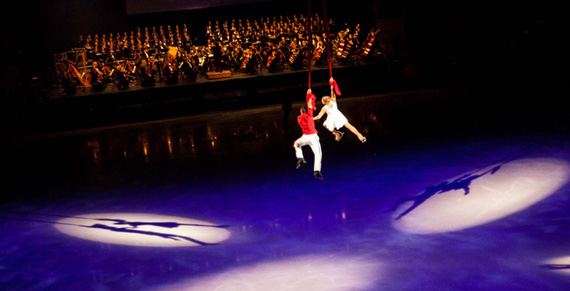
The Campaign for Boston University kicked off in grand style in fall 2012. Photo by Kristyn Ulanday
Because BU does not have the hefty endowment that substantially supports the operating budgets of some peer institutions, the University can count on endowment income for only approximately 4 percent of its operating budget, and on fundraising income for another 5 percent. (These figures are half of what many other private universities of comparable quality, scale, and scope depend on.) And although “this distinctive business model has helped build a great university,” according to Scott Nichols, senior vice president for development and alumni relations, “it’s high time for philanthropy to play a larger role.”
For example, Boston University currently gets 53 percent of the money it needs for buildings through borrowing, with just 6 percent coming from gifts and grants. The President and Trustees hope to substantially shift this balance, says Nichols, so that in the future, 50 percent can come from gifts and just 20 percent from borrowing.
Nichols says that without a major fundraising effort, an even greater burden will have to be placed on tuition, which is something that neither Brown nor the Trustees are willing to accept. This commitment is among the many reasons BU Trustees and Overseers have personally stepped up and pledged $130 million collectively to kick-start a campaign with a $1 billion goal.
While the campaign officially opened this fall, an unofficial “quiet” period began about two years ago, and it has yielded some impressive results. They include $25 million from Trustee Rajen Kilachand (GSM’74), the largest gift in BU history, to endow the Arvind and Chandan Nandlal Kilachand Honors College, and $15 million from Trustee Bahaa Hariri (SMG’90), for the Rafik B. Hariri Institute for Computing and Computational Science & Engineering.
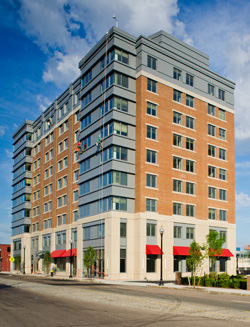
The new School of Medicine student residence. Photo by Cydney Scott
Campaign for Boston University gifts have also made possible the new School of Medicine student residence, the expansion and renovation of the School of Law, and the New Balance athletic field. They fund important professorships, such as the Peter Paul Professorships for junior faculty, given by Trustee Peter Paul (GSM’71), and a $1 million gift for the Reidy Family Career Development Professorship at the College of Engineering from Trustee Richard Reidy (SMG’82). For the past two years and through to the 2017 campaign finale, Trustee Richard Cohen (CGS’67, SMG’69) has pledged $300,000 a year to help send 15 undergraduate students to BU.
One distinctive feature of the campaign is the Century Challenge, an innovative program aimed at raising support for undergraduate scholarships. The proposition works like this: if a donor contributes $100,000 or more to establish an endowed undergraduate scholarship fund, the University will use funds from its existing financial aid budget to match the payout from that fund every year for 100 years (up to a maximum of $100 million). In effect, this will double the impact of the donor’s named gift.
Where Will the $1 Billion Go?
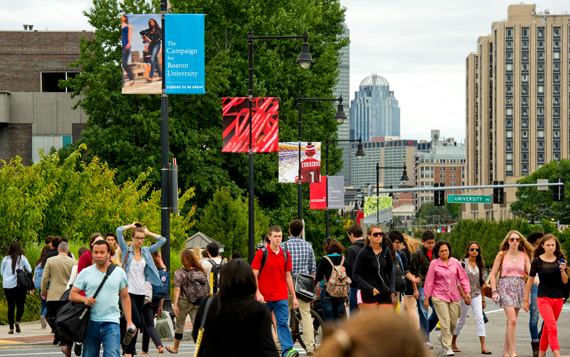
Photo by Cydney Scott
The campaign’s overall objectives are to allocate $150 million for support for students to ensure that BU remains accessible to highly qualified candidates, and $200 million for support for faculty to help recruit and retain outstanding scholars and teachers. The University has vowed to continue its program of gradually raising faculty salaries to competitive levels; a related goal is to increase the number of endowed professorships. The campaign’s goals also include $250 million to support research; $150 million to maintain and improve facilities; $150 million for special programs such as career services, libraries, and athletics; and $100 million for unrestricted and current-use gifts.
Parents, in particular, have a tradition of making immediate-impact gifts, says Jeanne Knox, chairman of the Parents Leadership Council and mother of Merrill (COM’06) and Bobby (CGS’08, SAR’10, SPH’12). The campaign, she adds, gives parents the chance to make a gift that will help current students—and create a legacy that will endure long after their own children have graduated.
“My children have benefited greatly from their BU experiences, which is one of the many reasons my husband, Bob, and I are so dedicated to the future success of the institution,” says Knox. “By participating in the campaign, and particularly in the Century Challenge, parents have the opportunity to improve their child’s college experience while also providing for future generations of BU students.”
And, according to Nichols, the broader choices that must be made during the campaign—which schools get how much money, which buildings get built, which professorships get funded, which programs get expanded, and so on—will go a long way toward defining the future of the University.
Which is why, he says, everyone needs to play their part. “Every contribution will be important.”
A version of this article originally appeared in BU Today. Additional reporting contributed by Andrew Thurston.
Reporting the Olympics
The seven Terriers competing at the 2012 Olympics weren’t BU’s only representatives in London this summer. Fourteen communication students reported from the city during a one-off study abroad program.
By Ashley Lisenby (COM’13)
Author photo courtesy of Ashley Lisenby
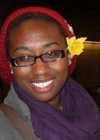
Ashley Lisenby
I am convinced reporting in London during the 2012 Olympics was a dream. Never in my wildest imagination did I think that I would be one of 14 Boston University graduate and undergraduate students interning for New England news outlets during the Summer Olympics.
The first three weeks of the program were devoted to a class on the history and politics of the Olympics; the last three weeks, to reporting for our news outlets. I had the privilege of working for Boston’s National Public Radio station, WBUR; other students were assigned to outlets such as Boston.com and WBZ.
Over the course of the trip, I visited the Olympic Park; met International Olympic Committee members and Getty Images photographers; attended an Olympic women’s soccer game; toured the BBC media center and the International Broadcast Center; and interviewed a British amateur boxer, a British Olympic basketball player, and an American Olympic rower.
My meeting at WBUR before the internship began felt like the moment in the dream when you are falling, and excitement and fear are fighting in your stomach. The station’s executive producer and web producer met with me and my internship partner to discuss their expectations of us. I remember thinking afterward, I hope I measure up.
Crossing the Pond

Raising cell phones in Trafalgar Square to record the end of the countdown to the start of the games. Photo by Megan Happ © Boston University News Service
My first assignment for the trip was to work on the Boston University Olympics website. Between journalism professor Michelle Johnson’s web expertise and my interest in web design and coding, we fashioned a site to showcase the work of BU’s Olympics reporters.
Aside from getting the website ready for the games, I was most excited about covering female athletes and women’s sporting events, especially boxing, which had its Olympic debut in 2012. My first pre-Olympic piece was on British amateur boxer Marianne Marston, the “Golden Girl.”

I arrived early at the gym where Marston teaches women’s-only boxing classes and waited until she arrived. Marston had no idea a reporter was coming that day.
She was direct and soft-spoken, but not timid. I recorded ambient sound of Marston training her student—the sound of gloves smacking hollow plastic pumped through my speakers.
After the class ended, I asked a few more questions, and I left the gym feeling accomplished and less intimidated. I thought: I can do this.
Then my first official assignment for WBUR’s Only A Game arrived. My internship partner and I had to gather the voices and sounds of London. We made mental lists of iconic London landmarks such as Big Ben, the Houses of Parliament, Westminster Abbey, and the London Eye in order to capture the sounds of a city on the brink of Olympic frenzy and the thoughts of people caught in the whirlwind.
On the day of the Olympic Opening Ceremonies, at 8:12 a.m., people gathered at famous landmarks to ring bells to welcome the start of the games. From the toll of Big Ben to bike bells on the sidewalk, London was alive with ringing for three minutes. I was capturing a fraction of the festive welcome from Leicester Square, not far from famous Piccadilly Circus, where a group had gathered around the Swiss Glockenspiel musical attraction.
A few days after we submitted the voices and sounds of London, our work was heard on NPR’s Only A Game.

Waving flags in anticipation of the opening ceremony. Photo by Amy Gorel © Boston University News Service
One of my favorite stories involved gathering reactions to “London Boosted,” an Olympic-themed installation by Czech artist David Cerny. Accompanied by grunts and groans, a vintage double-decker bus practiced push-ups with giant mechanical arms. Crowds of passersby stopped outside the Czech Hospitality House in North London to marvel or scoff at the athletic bus.
Another piece was about the much-anticipated gold medal women’s soccer match between the United States and Japan. My internship partner and I were on a mission to talk to fans from both teams. We were surrounded by flag-bearing, cape-clad, face-painted fans eager to tell two reporters how they got to the Olympics and who they hoped would win. To our surprise, disappointed Japanese fans were just as eager to talk to us after the game ended with an American victory.
Finally, perhaps one of the most memorable moments I had in London was interviewing U.S. Olympic rower Will Miller and his parents outside the Olympic U.S. Hospitality House. He and his parents spent an hour or so talking with two Boston.com interns and me about Massachusetts, rowing, and the Olympics. It was an honor to speak with the athlete, but his mother, in my opinion, delivered the most memorable and poignant words of the interview.
As a parent, said Sally Miller, “You’ve been there all along. You’ve watched them from when they were little and you’ve encouraged them as they’ve grown. And now you give them wings and let them go and hope they are just as happy with all of this as you are.”
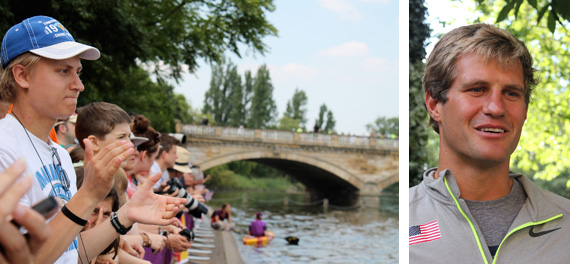
Crowds (left) at a rowing event. Photo by Amy Gorel © Boston University News Service. Rower Will Miller (right), Duxbury, Mass., native, met with BU interns to talk about his Olympics experience. Photo by Megan Happ © Boston University News Service
Lessons Learned
In the moments when no one was responding to my emails or phone calls and I wanted to give up, I realized that if I gave up on myself, it was unlikely that I was going to convince anyone else to take me seriously. I learned how to be persistent. I also learned that, while it is an accomplishment to get to a source first or have an exclusive interview, it is nearly impossible for one reporter to do everything on his or her own. Collaboration with other reporters in other mediums helps make a project stronger and well rounded.
My mother and grandmother tell me that from the time I started to write, I was writing sentences with misspelled words and backwards Rs on pieces of paper and calling them stories. My spelling has improved some since then, but my desire to tell stories hasn’t changed. Reporting at the London Olympics not only took me to a country I had never seen before, it also granted me the opportunity to do what I love—talking to people about their stories.
A version of this article originally appeared in COMtalk magazine.
Celebrating Tradition
Photos from the 2012 Commencement Weekend reception for dedicated BU parents.
Photos by BU Photography
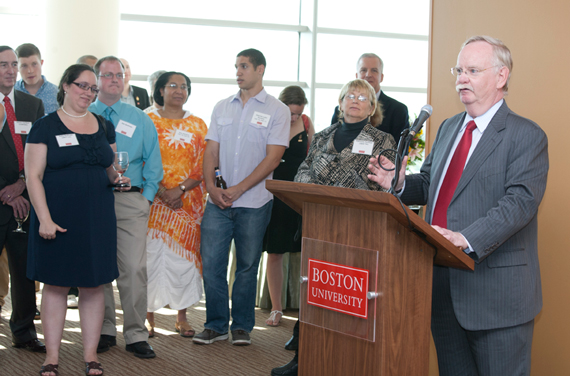
President Robert Brown welcomes graduating seniors and their families to Celebrating Tradition, May 2012.

From left, Kim Buttolph, Parents Leadership Council (PLC) member; her daughter, Kristen Buttolph (CGS’10, COM’12); Daryl DeLuca, assistant dean of students; and Katherine Kennedy, director of the Howard Thurman Center.
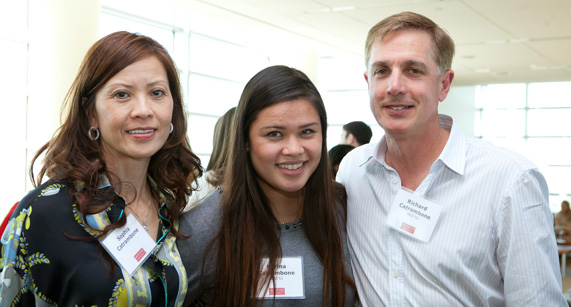
From left, Sophia Catrambone, Karina Catrambone (CAS’12), and Richard Catrambone (MED’92).
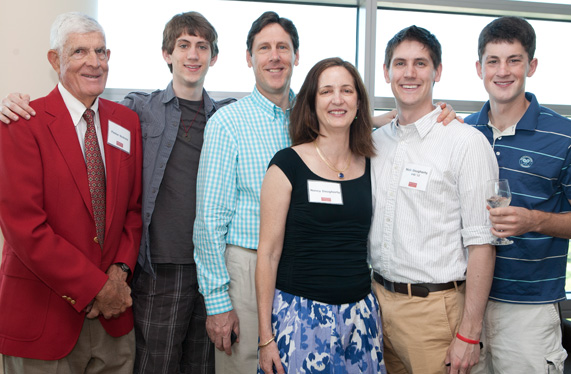
The Dougherty family, including Nick Dougherty (ENG’12), second from right, enjoys the event.
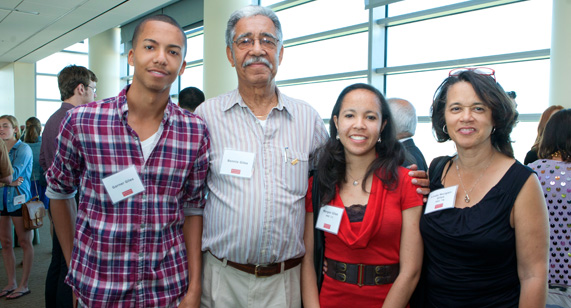
From left, Garner Giles, Bennie Giles, Morgan Giles (ENG’12), and Linda Morgan-Giles.

Maggie Tittler (SED’12), third from left, celebrates her graduation with her family.
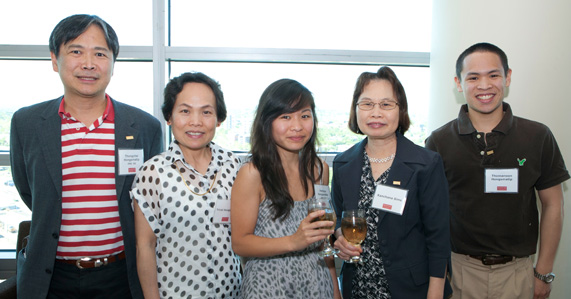
Thongchai Hongsmatip (ENG’00), Trirat Hongsmatip, Pattaya Hongsmatip (ENG’12), Kanchana Sims, and Thomanoon Hongsmatip.
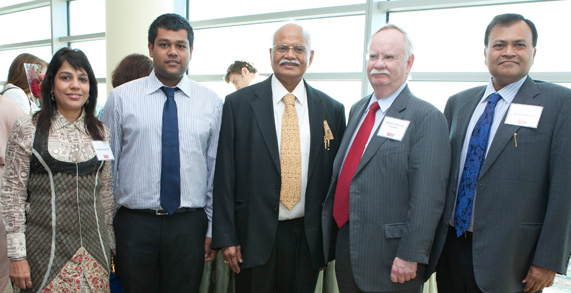
President Brown joins the Kanoria family, including Anant (CAS’12, SMG’12), second from left, and PLC members, Sunita, far left, and Sunil, far right.
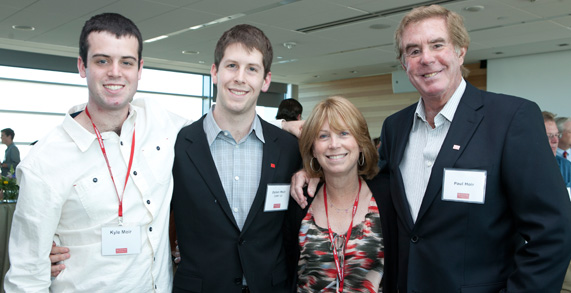
From left, Kyle Moir; Dylan Moir (COM’12); Becky Moir, PLC member; and Paul Moir, PLC member.
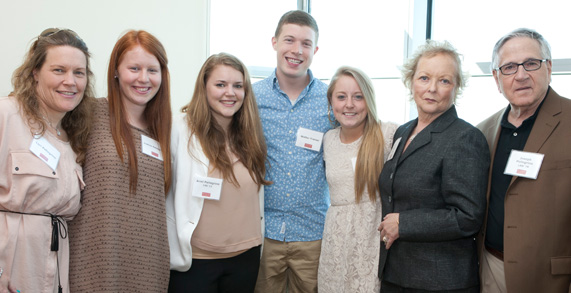
From left, Lori Pellegrino, Justice Pellegrino, Ariel Pellegrino (CAS’12), Walter Fraiser, Madison Pellegrino, Kathleen Pellegrino (ENG’62), and Joseph Pellegrino (LAW’78).
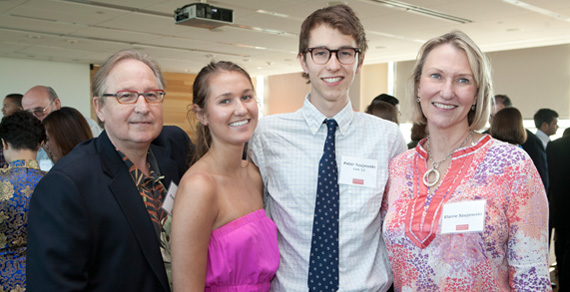
Pete Szujewski; Caroline Szujewski; Peter Szujewski (CAS’12); and Elaine Szujewski, PLC member.
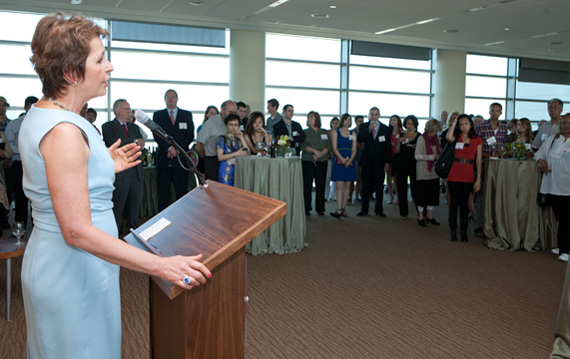
Jeanne Knox, chairman of the Parents Leadership Council, congratulates graduating seniors.
Summer Send-Offs
Photos from the incoming student welcome reception events in California.
Photos courtesy of Daryl DeLuca
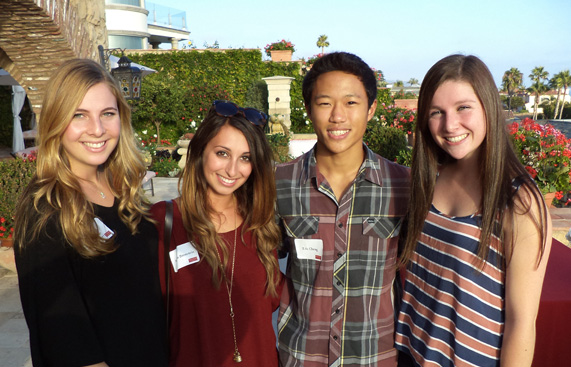
Madison Gordon (COM’14), Arden Bronstein (COM’14), Eric Cheng (SMG’16), and Sophie Gordon at the Laguna Beach Send Off Reception hosted by Madaline and Stephen Gordon.
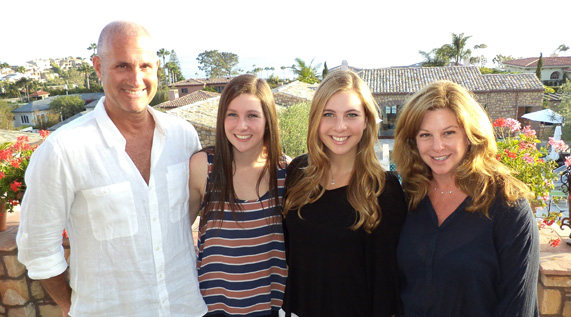
Laguna Beach reception hosts, Stephen, Sophie, Madison, and Madaline Gordon.
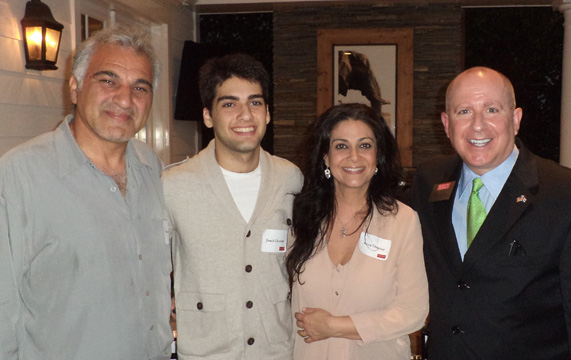
Orman Doustar, Jonah Doustar (CAS’16), Roya Doustar, and Assistant Dean of Students Daryl DeLuca at the Los Angeles reception.
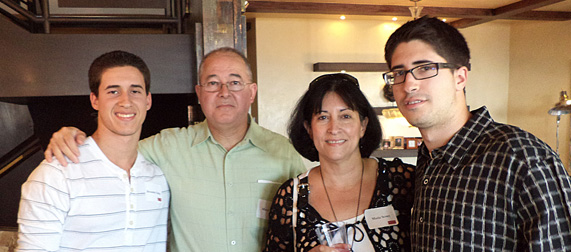
Alexander Valdes (CAS’16), Albert Valdes, Maria Valdes, and Phillip Valdes, Laguna Beach.
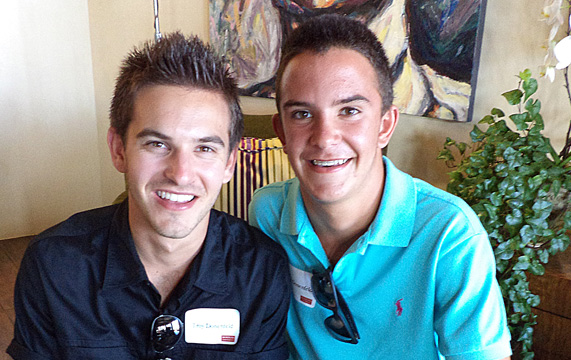
Troy Donenfeld (CGS’15) and Reed Donenfeld, Laguna Beach.

Melvin Gray, Rebecca Gray, and Janessa Pettway (ENG’16), Laguna Beach.
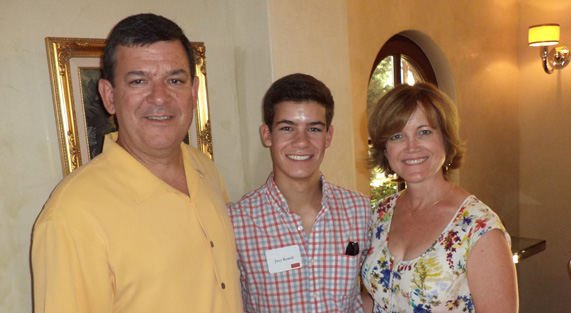
Joe Benoit, Joey Benoit (SMG’16), and Shelley Benoit, Laguna Beach.
Advice for Parents—From Students
They really do want your input on laundry and managing money. It’s just that they don’t want it every day. We asked current students for their advice to parents of undergraduates. Some of their tips might surprise you, some might not, but all will be useful as you navigate life with a child in college.
George Frimpong, of St. Paul, Minnesota, shares a move-in day hug with his daughter Melinda (COM’15). Photo by Kalman Zabarsky
Trust the work you’ve put into raising your child. By now they know right from wrong; for that, give yourself a pat on the back. Sure, they are going to hit some snags in the road, but isn’t that what the college experience is about—learning by experience?–Brandon Epstein (CGS’12, COM’14, CAS’14)
Don't be afraid to ask questions. The best way to show you care is to be interested and inquire about their new community and their life away from home. Every parent wants to give advice to their son or daughter, but the only way to make it valuable and relevant is to find out where your son or daughter needs help. I was shrinking my clothes and using fabric softener as detergent until my mom finally asked, “So, how is laundry going?”–Miles Greene (CAS’13)
![]() Get a Facebook account. Over the course of my freshman year, Facebook was the best way to keep my parents in the loop—and for them to share things with me—because it was something I was already in the habit of doing.–Molly Tobin (CAS’15) [Editor’s note: Don't forget to become a fan of the Parents Program, too.]
Get a Facebook account. Over the course of my freshman year, Facebook was the best way to keep my parents in the loop—and for them to share things with me—because it was something I was already in the habit of doing.–Molly Tobin (CAS’15) [Editor’s note: Don't forget to become a fan of the Parents Program, too.]
 Send care packages regularly. They can really turn a gray day into a great day.–Dexter L. McCoy (COM’14)
Send care packages regularly. They can really turn a gray day into a great day.–Dexter L. McCoy (COM’14)
We know you love us, but learn to let go a little. BU provides us with a lot of incredible experiences and we don’t have time to call every day. Don’t worry; we’ll call you and text you to let you know how much fun we’re having!–Rachel Ann Jensen (SED’14)
Academically speaking, your children may not do as well as they (or you) planned during their first semester. Talk to them about where they may need improvement and what they plan to do to succeed. Encourage them to visit the Educational Resource Center or to speak with faculty during office hours; both are excellent resources to help your child succeed in difficult classes.–Sekani Allen (CAS’13)
Keep in touch. The first few weeks at college can be overwhelming, and it can be easy for students to find their hands full and lose track of time. It may also be a good idea to discuss using ShareLink on the University’s Student Link to keep track of their meal plan, convenience points, and grades for the semester.–Kevin Flynn (CAS’14)
 When you visit, take your student and his or her friends to Sunset Cantina for nachos. It's always fun to meet other people’s parents, and Sunset’s nachos are the best. My personal favorite is the South of the Border nachos with BBQ pulled pork and extra guacamole.–Colin O’Neill (CGS’12, SED’14)
When you visit, take your student and his or her friends to Sunset Cantina for nachos. It's always fun to meet other people’s parents, and Sunset’s nachos are the best. My personal favorite is the South of the Border nachos with BBQ pulled pork and extra guacamole.–Colin O’Neill (CGS’12, SED’14)
Give your child room to grow. College is a transition into adulthood and an opportunity to find independence. Trust your children’s judgment; be supportive (without solving their problems); and understand they will communicate with you at their own pace.–Alison Weltman (COM’13)
At the beginning of the semester, encourage your student to stay at BU every weekend. The first few weeks are when students gather in common rooms and form friendships; it is also the time when BU has the most free events.–Stephanie Dolce (SED’13)
 Stay up-to-date on your student’s academic life. Give a call or send a text asking how an exam went or how a specific class is going. Having my parents there to understand what’s going on and provide input and advice is really great.–Crystal Shah (CAS’14, SED’14)
Stay up-to-date on your student’s academic life. Give a call or send a text asking how an exam went or how a specific class is going. Having my parents there to understand what’s going on and provide input and advice is really great.–Crystal Shah (CAS’14, SED’14)
Make the first homecoming event special. When I came home for Thanksgiving, it was after the longest period of time I’d ever been away from home. My mom had gone to the grocery store and stocked up on my favorite foods so I could have those things I’d been craving after many dining hall meals. This simple gesture was the perfect amount of “We missed you!” without being over the top.–Molly Tobin (CAS’15)
A Letter from the Chairman of the Parents Leadership Council

Dear Fellow Parents,
The Fall semester is a time of excitement, reflection, and change for both parents and their students. In this issue of Parent, we give you a small glimpse into life on campus, sharing stories from students about building a community at Hillel House, finding friends with an extracurricular acting group, and fulfilling childhood dreams by reporting from London during the 2012 Summer Olympics. We also have some fun tips for parents—from students.
This fall has been an especially eventful one at Boston University. We kicked off the academic year by opening our brand-new, $50 million Center for Student Services. Later in September, we held a dazzling Celebration of BU event at Agganis Arena to launch a historic and first capital campaign for this great University. We also honored the College of General Studies as it celebrated its 60th anniversary. I am particularly fond of CGS, as my son, Bob, and my niece, Margaux, started their college experiences there under the excellent guidance of Dean Linda Wells and her great faculty.
Parents, our next big event, Parents Weekend, is all about you and your student. I look forward to welcoming you to campus, October 19–21, as fall continues to showcase our great University. See you there.
Best wishes,
Jeanne
Jeanne Knox, Chairman, Parents Leadership Council
Mother of Merrill (COM’06) and Bobby (CGS’08, SAR’10, SPH’12)
2012–2013 Parents Leadership Council
- George Altirs
Saddle River, NJ
Charlotte (CGS'12, BU'14) - Kim Buttolph
New Canaan, CT
Kristen (CGS'10, COM'12) - Marie Pinak Carr
Washington, D.C.
Elizabeth (SHA'10) - Neal (CGS'80, CAS'82) & Diana (CAS'81, COM'82) Cohen
New York, NY
Lindsay (CGS'10, COM'12) - Haim & Barbara Dabah
New York, NY
Stephen (CGS'12, BU'14) - Jacqueline Dedell
Litchfield, CT
Skylar (CGS'10, CAS'12) - Susan Domolky
Boston, MA
John (CGS'11, SHA'13) - Lisa Gilligan
New York, NY
Kathryn (CGS'10, CAS'12)
Meghan (CGS'11, COM'13) - William & Debralee (CGS'76, CAS'78) Goldberg
Ontario, Canada
Benjamin (CGS'07, SMG'09) - Prem & Mamta Gupta
New Delhi, India
Ishaan (SMG'10)
Samvid (SMG'14)
- Jamie Harris
New York, NY
Daniel (CGS'11, COM'13) - Lisa Stewart Jacobs
(CAS'77)
New York, NY
Jesse (SHA'08)
Eric (CGS'09, SHA'12)
Emily (COM’16) - Thomas Joyce
San Diego, CA
Dillon (SMG’14) - Sunil & Sunita Kanoria
Kolkata, India
Anant (CAS'12, SMG'12) - Jeanne Knox
(Chairman, PLC)
Greenwich, CT
Merrill (COM'06)
Bobby (CGS'08, SAR'10, SPH'12) - Steve & Julie Lifton
Sands Point, NY
Ali (CGS'12, COM'14) - Damelys Marin
Weston, CT
Daniel (COM'15) - Marten & Annika Mickos
Los Altos, CA
Johan (ENG'14) - Paul & Becky Moir
Los Angeles, CA
Dylan (COM'12) - Gurramkonda N. & G. V. Naidu
Peoria, IL
Harini (CAS'08, MED'11) - Karma Roberts
Oakland, CA
Mark (CGS'06, CAS'08)
Hilary (CGS'10, COM'12)
- Jay & Liz Roewe
Los Angeles, CA
Chris (COM'14) - Betsey Ruprecht
Greenwich, CT
Andrew (CGS'11, SHA'13)
Charles (CGS'11, SHA'13) - Ian and Lisa Schapiro
Pacific Palisades, CA
Shaun (CGS’13, BU’15) - Yannis Skoufalos &
Maria Kalomenidou
Mason, OH
Georgios (ENG'15) - Mark B. Smith
Calabasas, CA
Spencer (CAS'15) - Tessa Smith McGovern
Westport, CT
Danielle (CGS'13, BU'15) - Christina Strassfield
East Hampton, NY
Zoe (CAS'15) - Elaine Szujewski
Chicago, IL
Peter (CAS'12) - Maria Vecchiotti
New York, NY
Stephen Tanico (CAS'13) - William & Olivia Weeks
Southport, CT
William (CGS'06, CAS'08)
Whitney (CGS'08, CAS'10)
Olivia (CGS'10, CAS'12) - Wayne (CAS'79) & Deborah Zuckerman
Livingston, NJ
Andrew (CGS'13, BU'15)
Did You Know?

A tie-wearing graffiti artist? The BU Rock provides a (legal) spot for Greek groups to spray their names on campus. Photo by Vernon Doucette
BU Rock Tops 1,000 Layers of Paint
In the shade of the School of Law tower and the shelter of Marsh Chapel sits a small rock. How small? No one is quite sure anymore because the rock is covered in more than 1,000 layers of spray paint.
The Boston University Greek Rock—more commonly known as the BU Rock—is regularly tagged by fraternities and sororities competing with each other to make an administration-approved mark on campus. During the annual Greek Week, it becomes an acrylic-covered chameleon, changing color (and Greek letters) almost daily.
The BU Rock used to live on Commonwealth Avenue at the BU Bridge, but was moved to its present location on the BU Beach after a campus walkways improvement project in 2007. One day, the rock may even snag a world record—just 17,000 layers of paint to go.
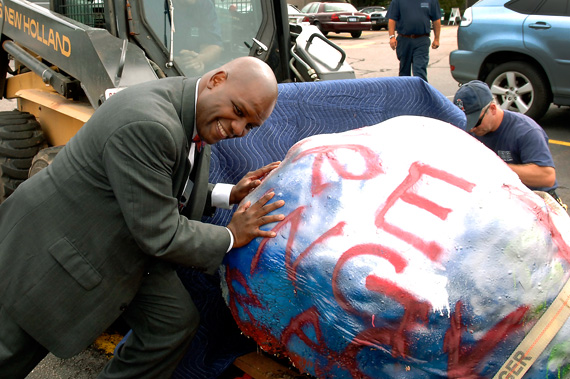

Dean of Students Kenn Elmore (top) during the BU Rock’s 2007 move. At its new home on the BU Beach, the rock is subject to color changes come snow or sun. Photos by BU Photography
What’s Hot, What’s Not

| Facebook—as usual | Google+ |
| Froyo food truck | Cold Stone Creamery |
| "Call Me Maybe" by Carly Rae Jepsen | "Friday" by Rebecca Black |
| The Patriot League | America East |
| Redbox | Netflix |
| TOMS | Crocs |
| Tumblr | |
| One Direction | Justin Bieber |
| Center for Student Services and Fresh Food Company at Marciano Commons | GSU and East Campus dining halls |
| Amazon | In-store shopping |
| High-waisted pants and shorts | Short shorts |
| Pretty Little Liars | Gossip Girl |
By Andrea Bergman (CAS'12)
Backstage Pass
The actors at BU’s oldest student theater group are many things, but there’s one thing they’re all not: acting majors.
By Jon Erik Christianson (CAS’14, COM’14)
Photo of Stage Troupe rehearsal by Vernon Doucette
“This is going to be the death of me,” I said as I typed “how to build a coffin” into Google. A few instructional websites came up, but none fit the requirements. We needed to build four identical coffins that were light enough to be carried, but also sturdy enough to be jumped on. To make matters worse, our most experienced coffin builder was not picking up his phone.
On the bright side, I had just found out that locating fake guns and explosives was going to be much easier than I had thought.
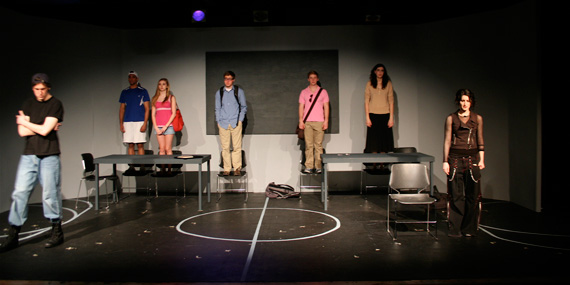
A scene from “columbinus”. Photo by Sarah Ann Adams (CAS’11)
This is just one window into my life with Stage Troupe, Boston University’s largest and oldest student-run theater group. The coffins were for columbinus, a play based on the Columbine High School massacre, and one of 12 productions I have worked on since joining the group in the fall of 2010. Established in 1950, Stage Troupe is an acting group with a difference: the actors are not professionals. One of its 300 members, I'm a student at the Colleges of Communication and Arts & Sciences by day and a member of the tech crew—or “techie”—by night. In an average year, we put on at least eight “mainstage” shows and host a myriad of special projects, such as biannual one-act festivals and a “Tech Show” (where the techies act, the actors tech, and the audience stays the same). The mainstage shows include a Parents Weekend musical in the fall—our 2012 production will be Little Shop of Horrors; scroll down for ticket details—and a charity show in the spring.
Unprofessionals Acting Professionally
The actors of Stage Troupe might not be professionals, but that’s not to say they aren’t professional—they’re just not theater majors in the College of Fine Arts. Instead, Stage Troupe seeks to give future engineers, teachers, and businesspeople a stab at the spotlight.
“It’s something that’s fun for me; I’d never want to make it a job,” says Allie Romano (CAS’13), a psychology major and current Stage Troupe treasurer.
Despite not wanting to make acting her job, Romano has certainly worked hard at Stage Troupe. In a little over two years, she has acted in eight productions, worked in eight technical positions, directed a one-act play, and spent a year as treasurer.
Her dedication stems from her very first experience with Stage Troupe, when she was cast as the supportive grandmother Nat in the family drama Rabbit Hole.
“When I think of Rabbit Hole, I think of sunshine and butterflies and beautiful fall afternoons and having hope again in life,” says Romano, who admits she found the transition to college life a difficult one. “It gave me everything. Troupe has given me a family; it’s given me something to do outside of classes.”

Travis Cherry (CAS'12) and Meagan Bernatchez (CAS’14) in “Farragut North”. Photo by Katy Meyer (COM'14)
Beyond Stage Troupe
While Stage Troupe may have given Romano a family, it inspired BU alum Josh Friedensohn (ENG’10) to shift career paths.
“Doing theater in college, which was never something I thought I was going to do, has oriented my career goals so much,” says Friedensohn.
In his four years with Stage Troupe, he held technical positions in more than 30 productions and served as technical advisor during his senior year. After graduating with a degree in mechanical engineering, he became a production and operations assistant at BU’s Tsai Performance Center. He’s also expanded his skills with the Vagabond Theatre Group, an arts organization based in Boston and founded by Stage Troupe members past and present.
 “I’m pretty sure in about a year I’ll be going to grad school for theater,” continues Friedensohn. “Stage Troupe really ignited my passion for theater and creativity and how I can apply my college degree to that creative field.”
“I’m pretty sure in about a year I’ll be going to grad school for theater,” continues Friedensohn. “Stage Troupe really ignited my passion for theater and creativity and how I can apply my college degree to that creative field.”
Romano, on the other hand, says that although acting won’t become a career, Stage Troupe has nevertheless shaped her future plans. Hoping to become a school psychologist, she “would like to run a theater program at [my future] school.”
Before she gets that far, however, she’ll have to navigate her upcoming job that’s not a job—directing Stage Troupe’s fall 2012 Parents Weekend musical, Little Shop of Horrors.
“I love Little Shop!” she exclaims. “It’s so much fun; it’s dark and it’s creepy and it’s exciting and it has all this energy.”
Why I Cared about Coffins
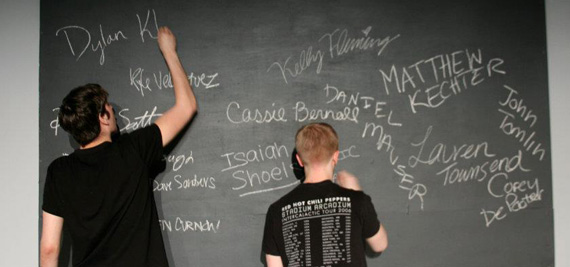
Ryan Chernin (SHA’15), left, and Dan Stevens (SMG’14) in “columbinus”. The names on the blackboard are those of Columbine High School massacre victims. Photo by Sarah Ann Adams
Through Stage Troupe, Romano found a family, Friedensohn found a different future, and I found a cause worth fighting for. Finding a solution to my coffin dilemma wasn’t just about ensuring the show could go on. columbinus was Stage Troupe’s spring 2012 charity show. Every dollar raised would be donated to the Gay, Lesbian & Straight Education Network (GLSEN), one of the largest antibullying organizations in the country.
People in Stage Troupe, many of whom had been bullied in high school, came together to work on the show. To give the most money possible to GLSEN, we worked without a budget. In four weeks, we put up a show, coffin assembly included, with a strong antibullying message and raised over $2,000 for a worthwhile cause.
For me, Stage Troupe is special not because it supports a large membership. Stage Troupe is special because its large membership supports people, both inside and outside of the club.
Little Shop of Horrors will be performed October 19–21, 2012. Tickets will be available at the door at the Tsai Performance Center; students may purchase tickets in advance from Activities Information, located on the second floor of the George Sherman Union.
Community—and Pancake—Central
For the University’s Jewish students, it’s a religious home and community center; for everyone else, Hillel is a great place to grab a pre-exam pancake.
By Chelsea B. Sheasley (COM’13)
Cake decorating contest photo by Vernon Doucette
Between its potato pancake fest, Latkepalooza, and breakfast eatery-inspired JHOP event, Boston University’s largest student organization gives out a lot of home-style comfort foods.
Hillel is the center of religious and community life for much of BU’s Jewish population. The self-described “Jewish student union” is based at the Florence & Chafetz Hillel House, a modern brick-and-glass, four-story building on Bay State Road overlooking the Charles River. It’s a gathering point for Jewish students on campus, providing kosher dining facilities and religious services for Conservative, Orthodox, Reform, and Sephardic Jews, who all together make up roughly 10 percent of BU’s student body.
According to its long-serving director, Rabbi Joseph Polak (Hon.’95)—he’s entering his 43rd year with the organization—Hillel plays many roles on campus, including that of a service agency and a Jewish community center. It is a “university community where people care about each other,” he says.
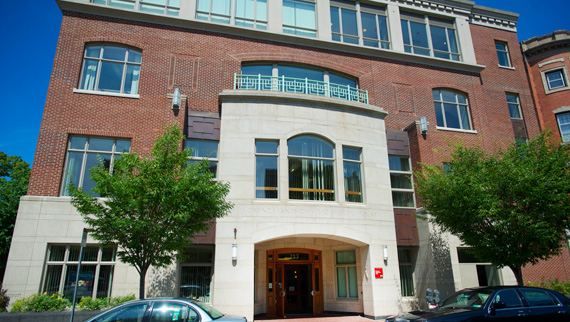
Hillel House. Photo by Cydney Scott
Connecting to Other Cultures
At any one time, Hillel House is home to more than 30 different student groups, open to all, that cover everything from a cappella, dance, and theater to community service and politics. On top of that, a student board plans hundreds of social events per year.
“It’s really great because you would think that it’s very sheltering, that you only meet other Jewish students, but that’s 100 percent not the case,” says Joel Udwin (SMG’14), the current president of the student board. Hillel House, he says, “Allows me to fulfill what I need for my culture and my religion, while also being exposed to other cultures and other peoples.”
In February 2012, the Hillel student board cosponsored a comedy show with Umoja, BU’s black student union, that addressed respective stereotypes. Hillel has also teamed up with fraternities and sororities for community service projects and formed the Ken-Si Collaborative (the words for “yes” in Hebrew and Spanish) with Latinos on campus to explore opportunities for collaboration and support.
3,000 Pancakes, Two Hours

A central component of Hillel House is reaching out to others off campus, too. Each year, the house hosts two mitzvah days, where the entire day is devoted to community service in the metro Boston area. Other Jewish students in Boston are also invited to use Hillel House’s facilities, and many come for kosher meals or Friday night Shabbat dinners. During the Jewish high holidays, attendance numbers are in the thousands, says Polak.
Two of the most popular events that bring people to Hillel House are Latkepalooza and JHOP. Latkepalooza is a party that happens every year close to Hanukkah, when latkes (potato pancakes) are a traditional dish. It draws hundreds of students for latkes, music, and celebration. “We have over 700 students, Jewish, non-Jewish, some eating latkes for the first time,” says Udwin. “We’re playing Israeli music; we’re eating our latkes; it’s a great time.”
JHOP, modeled after IHOP (International House of Pancakes), the popular restaurant, is a breakfast hosted by Hillel the week before exams. In 2012, it went through 3,000 pancakes in two hours.
Questioning Values
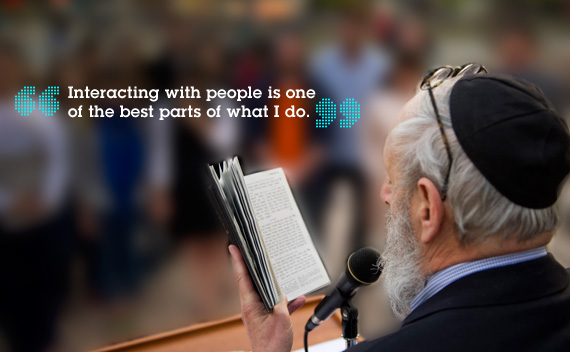
Rabbi Joseph Polak, chanting a prayer for those who died in the Holocaust, has been with Hillel House for 43 years. Photo by Kalman Zabarsky
The layout of the house itself is designed to bring people together. Study pods with comfy couches and tables are scattered throughout the building and a lounge features two flat-screen TVs and pool, Ping-Pong, and foosball tables.
“The number of people who use the building to study, hang out, or crash after class is in the hundreds,” says Polak.
Rabbi Polak teaches Torah classes and preaches, but all the services are student-led. “We are not a clergy-led religion,” he says. Part of his job, though, is to serve as a mentor to students, and he interacts with them often.
“He’s someone who you can always go and speak to. He’s very, very available,” says Udwin. “He really cares about what’s going on.”
“Interacting with people is one of the best parts of what I do,” Polak says. Sometimes he has to “shake people up and have them question values, where they’re coming from. It’s my job, what I like to do.”
Hillel has a website just for parents—www.bu.edu/hillel/parents—with FAQs, newsletters, and opportunities to get involved.
College of General Studies Hits 60
Once the best-kept secret in liberal arts education, the College of General Studies celebrates its 60th anniversary with a growing national reputation.
By Andrew Thurston
Photos by BU Photography
It would make an intriguing, if slightly ominous, riddle: name the college that admits the second-largest freshman class of any at BU, but from which no one graduates.
If you’re new to BU, the College of General Studies (CGS) can seem like a quirk.
Now in its 60th year, CGS is home to the University’s two-year general education curriculum for freshmen and sophomores: students do not graduate from it, but enroll with guaranteed continuation to almost any BU undergraduate program. With classes in social sciences, humanities, and rhetoric, it’s as though a small liberal arts college has been tucked into a major research university. According to Dean Linda Wells, CGS is “the best interdisciplinary, general education program in the country”— if you ask some students, it’s also a great way of stalling that final decision on a major.
Evolving History
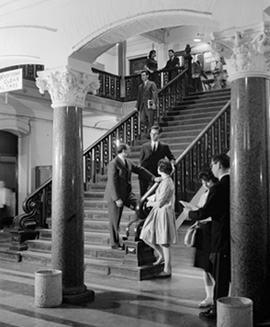
The marble halls of "Junior College" in downtown Boston. Photo courtesy of BU Photography
Back in 1952 when CGS was established with the name Junior College, its mission was simple: educate World War II and Korean War veterans taking advantage of the GI Bill’s free tuition. It was founded on principles that would appeal to those fresh from the frontlines: a team-teaching structure, small classes, close relationships with professors, and a tough interdisciplinary liberal arts education.
Six decades later, those values remain—even if much else from the fifties doesn’t. The original college building in Boston’s Copley Square was demolished for an expansion of the Boston Public Library in the sixties; the name “Junior College” was consigned to history in 1960. The faculty has been transformed, too. The staff listed in student handbooks from the fifties—complete with home addresses and marital status—were often instructors with a single degree; today’s faculty all hold PhDs.
And the modern CGS student? As the proud parents reading this well know, they’re already academic achievers. While the College made its early reputation cultivating students with unproven academic potential, it now attracts those with paper grades among the best in the nation: the class that joined CGS in fall 2012 entered with an average GPA of 3.4, putting them in the 89th percentile. In their time at CGS, they'll follow a rigorous core curriculum, tackle electives at other BU schools and colleges, and have the opportunity to study abroad.
Mavericks and Adventurers
But, grade point averages aside, Dean Wells has noticed a CGS type in her 30 years at BU: “I think students who come to this college still tend to be kind of mavericks. They like being unique, and they like meeting other kids who are. They’re definitely drawn, always have been, to the international and cosmopolitan flavor of BU; that means they’re adventuresome.”
![]()
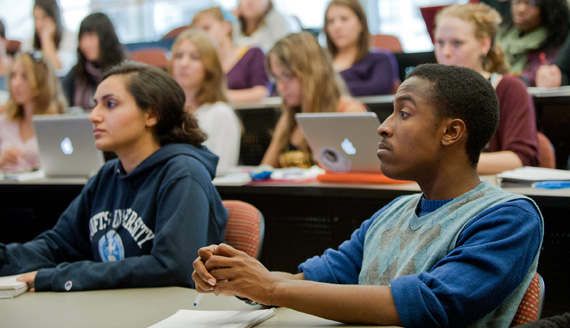
CGS students in a class taught by Professor of Humanities Natalie McKnight. Photo by Kalman Zabarsky
If you talk to alums from any era (you can check out a list of notable CGS alums on the College’s website), those similarities are reflected in their memories.
“I think they will say they made their best friends here—even way back when,” says Wells. “The team structure gives them a sense of belonging. Most alums remember CGS in a way that they don’t necessarily remember their junior and senior years.”
Central to that is the Capstone Project. A 50-page group paper culminating in an oral defense, Capstone is often considered the defining CGS experience. Teams of sophomores are given a contemporary real-world problem—Should the U.S. join the International Criminal Court? In a future of genetic sequencing, who owns our genes?—and given four weeks to come up with a solution, either in the form of a policy recommendation or an arbitrator’s ruling.
Mark DiCristofaro (CGS’06, COM’08), now a film producer in California, completed his Capstone Project on eminent domain. “Will I ever need that knowledge? Maybe. But what I do use on a daily basis is the ability to think critically, problem solve, and communicate as a team member. Those are distinctions, in my experience, that have enabled me and other CGS alumni to take on projects of all types with the confidence and the desire to make a difference in our fields of choice.”
What Does the Future Hold?
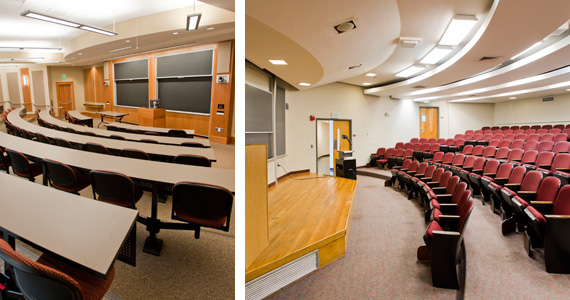
Recent renovations at CGS have improved community and study spaces. Photos by Kalman Zabarsky
What's next for CGS? Will it celebrate a 75-year anniversary? And, if it does, where will it be and what will it be called? Given recent renovations to the lobby, classrooms, and study centers at its present location, 871 Commonwealth Avenue, it will probably stay put. But the name?
“We have wanted to change the name,” reveals Wells. “We just can’t set upon what.” The College of Integrated Liberal Studies? Too vague, perhaps. The College of Interdisciplinary Studies? Pronounced with a hard c, not the best acronym. But Wells does think a name change “might be helpful” in the College’s quest to “have more national visibility.”
The first step in that push was the 2011 opening of the Center for Interdisciplinary Teaching & Learning. Wells likens it to a research center at a hospital—a place to study and promote improved approaches to its primary mission. “The center will allow us to do a better job of teaching first- and second-year students,” she says, “and a better job of communicating nationally and internationally the value of a liberal arts general education.”

It’s a value Wells believes is universal. In fact, forget the 75th anniversary; she’s confident CGS will celebrate its 130th birthday party in fine health.
“In 70 or 75 years, I imagine this college will still be here because what we offer seems to resonate with students and parents,” she says. “Classically educated students who know how to analyze, research, problem solve, speak and write well, and work both independently and on a team—sounds like a winning formula for a great job or career.”






